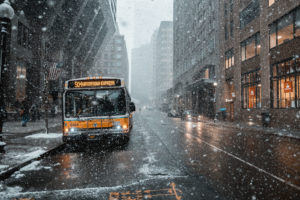Transportation Is Key For People with Disabilities in America
by Rachel
 On October 3, WalletHub released its 2017 list of the Best & Worst Cities for People with Disabilities. A quick scroll through the methodology lets the reader know that economy, quality of life, and healthcare factors were used to determine how a city ranked overall. All three are significant factors that contribute to how, on average, a city provides opportunities for housing, employment, medical well-being, and the ability to enjoy a good meal at a favorite restaurant or a walk in the park.
On October 3, WalletHub released its 2017 list of the Best & Worst Cities for People with Disabilities. A quick scroll through the methodology lets the reader know that economy, quality of life, and healthcare factors were used to determine how a city ranked overall. All three are significant factors that contribute to how, on average, a city provides opportunities for housing, employment, medical well-being, and the ability to enjoy a good meal at a favorite restaurant or a walk in the park.
We think there’s a factor missing in the methodology, though: Transportation. You can’t get there if you can’t get there.
The three quality of life metrics examined in the WalletHub research that come the closest to transportation include: number of wheelchair-accessible trails per capita, share of population within walkable park access, and walkability. All good, and metrics that Easterseals supports as part of its mission to make positive, profound differences in people’s lives every day.
Walking is a form of transportation and getting to parks or trails is dependent on completed pathways, curb ramps, and safe places to cross the road, but WalletHub missed out on the chance to measure a very important metric: availability of public and private transportation options. Whether bus, rail, accessible paratransit, taxi, ferry, shared-ride, bikeshare or a neighbor lending a hand as a volunteer driver, transportation availability is the key that opens the door to education, jobs, doctors’ appointments, shopping, and hobbies.
Easterseals has been at the forefront of helping cities in the U.S. address the transportation needs of people with disabilities. In her reaction to the WalletHub article, Easterseals blogger Beth Finke mentions that the availability of public transportation in Chicago means that she can live more independently, and as Karin Willison, blogger with The Mighty, points out in her own take on the WalletHub list, transportation is essential to quality of life and should not be left out of the ranking equation.
Transportation is important to Easterseals because we know how important it is for people with disabilities who want to live life as independently as possible. Easterseals has collaborated with communities across the country for over three decades to support the availability of ADA-accessible transportation.
From Easterseals Project Action’s work offering training to transportation professionals to the technical assistance we provide through the National Aging and Disability Transportation Center and National Center for Mobility Management to our local-level in-person facilitation that’s part of the Accessible Community Transportation Initiative, we want to help all cities in the U.S. be the best that they can be when it comes to providing affordable, accessible transportation.






